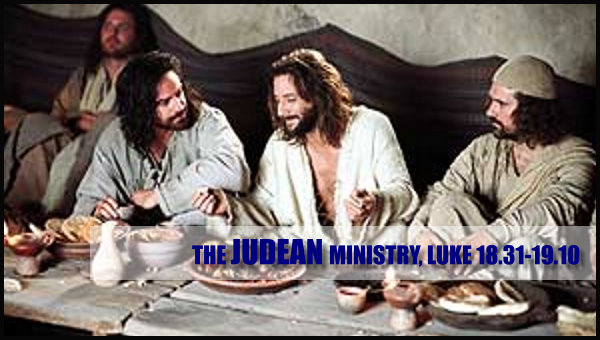By Tyson Thorne

The Judean Ministry at Various Cities (19.28-24.53), 18.31-19.10
As one gets closer to death, it begins to become a natural part of conversation. I have a friend with cancer who is counting every day a blessing. I am grateful for her faithfulness and outlook on both the remainder of her days and her eternal destiny. Another friend, facing a different disease entirely, talks about being afraid of dying. Others, who aren’t suffering from anything besides old age, do the same; it’s a natural part of the human condition. So there is nothing morbid about Jesus telling his disciples about his eminent fate in Luke chapter 18.
Jesus describes in remarkable detail the events leading up to his crucifixion. This isn’t Luke taking liberties with the story as some critics argue, all the details are included in bits of prophecy spread throughout the Old Testament prophets. We’re told that the disciples – not a one of them – understood what Jesus was telling them. This is not to say that they could not understand his words, or that God’s Spirit somehow muddled the message to keep it a secret. It is more likely that they could not comprehend such a thing happening to God’s chosen one. It was impossible.
It is easy to dismiss uncomfortable conversations. When an older person, a grandparent for instance, talks to a younger person about their death the conversation becomes awkward. Often the young person will say they don’t want to talk about such things. Perhaps the apostles found themselves in a similar fugue. If only they had listened closely, it may have kept them from despair during the short time Jesus was in the grave. In either event, the conversation was hidden from them until the proper time.
Later Jesus was nearing Jericho, about 18 miles northeast of Jerusalem, when he and his entourage came across a blind beggar. Hearing the crowd the man asked what was going on. When he heard it was Jesus passing he shouted out, “Jesus, Son of David, have mercy on me!” Anyone familiar with Jesus would have wondered if the man was senile, for Jesus was the son Joseph. By addressing Jesus as the Son of David he revealed that he believed Jesus to be the Messiah, who was to be a descendant of King David. This piqued Jesus’ interest and instructed the blind man be brought to him. The handicapped beggar clearly had faith and believed Jesus to be the long-awaited Messiah. Jesus tells him it is this faith that healed him. This miracle resulted in much praising of God, as intended.
Jesus then entered the city proper and met up with a wealthy tax collector named Zacchaeus (famous for his lack of stature). As we discussed in the previous chapter, it is unlikely for a wealthy man to be saved for he clings too tightly to his riches. Zacchaeus is the proof of Jesus’ statement that “all things are possible with God.” God does something impossible with the most ordinary of men and lovingly restores a community in the process.
Seeing the corrupt tax collector, he calls to him by name. The two men had never met before, so how is this possible? God knows his name. God knows all of us by name. There should be some comfort in that truth for those who are near to death. Jesus calls to this man who had extorted the people of the city and bestows upon him a great honor (culturally speaking), the opportunity to show hospitality. The crowds were upset at this, the now famous Rabbi eating with the cities greatest sinner. Yet after inviting himself to lunch, the men sit down to eat and Zacchaeus makes Jesus an exaggerated promise.
He tells Jesus he will stop his corrupt practices, give half his wealth to the poor and repay anyone he has cheated four times as much. It is unlikely Zacchaeus could fulfill such a promise, but in their culture exaggeration was used to show sincerity. Jesus believed him, and before the tax man can make good on his promises Jesus forgives him. This too was anti-cultural; it was normal to forgive wrongdoing only after restitution had been made. Jesus’ careful adherence to cultural norms, and knowing how to carefully break them, he performed a miracle that saved a rich man’s life and cleaned up the corrupt tax collection practices of an entire city.
We don’t know what became of Zacchaeus, we only have Jesus’ confidence in him to speculate. Similarly, we rarely know what our legacy will be. We can plan for our death and set aside those possessions we want to pass along to others, but what will our spiritual legacy be? Will others speak of a changed life? A way of living that surpassed understanding? Testify to the kindness and hospitality you’ve shown? Perhaps it is less morbid and more practical to consider our life, and our death, so that we too might leave a legacy of spiritual truth.
|
|
